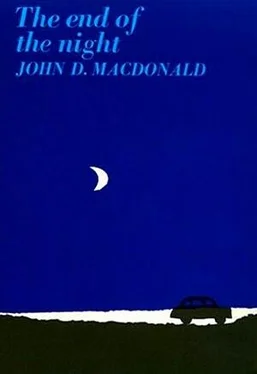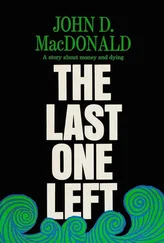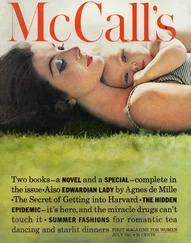We brought both cars along. Sandy had another sparkling idea. We found a big auto dump, ran the Buick far back into the clatter, stripped off the plates and threw them into the night.
“Let them figure that the hell out. It’s like confusion, man,” he said. “How’s baby doing, Kirboo?”
“I don’t know. Maybe not so good.”
We had another hot, fast car. We moved east, digging deeper into the night, never missing the little roads that Sandy had looked up and remembered. He had a complete map inside his head, and we were a little light moving along it.
I had to have a thoroughly empty road. If we were rushed by an oncoming car, it could go sour. And finally we were on a road that suited me. I took her hand and squeezed it hard. She squeezed back. And suddenly she began to breathe in a deep, rasping way, articulating each exhalation.
“What the hell?” Nan said, looking around.
“I don’t know,” I said. “I think she could be dying.”
The great raw breathing went on, very audible over the sound of the motor and the tires and the night wind. It stopped abruptly.
“Is she dead?” Sandy asked.
Before I could answer, the breathing began again, slowly at first and then picking up the previous tempo.
“The next time,” I said angrily, nervously, “it may stop for good, and the last thing I want back here with me is a dead blonde. Let’s leave her the hell off, Sandy. This looks like a good place.”
He slowed the car, then suddenly swung off into a wide and level dirt road. He deftly worked it around until we were heading out, and turned off the lights and the motor. The breathing seemed three times as loud.
“Jesus, that’s a terrible noise,” Shack said. I got out quickly and went around the car and opened the door on her side and got her out. She was completely limp. I got her under the armpits and dragged her. Her shoes came off. I could see them, and the tracks her heels made by the light of a high half moon.
Sandy was beside me. “Where you taking her?”
“Off in the bushes.”
We were talking in whispers. I heard Nan say, back in the car, “Hones’ ta God, Shack, with you it’s a disease.”
And that cut the problem way down. I had been most nervous about Nan and her little knife, and her high delight in using the little knife.
I heard the sound of a brook as I pulled her into the bushes. And suddenly the ground dropped away and the girl and I went crashing and rolling down a short, steep bank into an icy stream. I cursed and hugged my elbow and got up onto my knees, in about five inches of water.
I suddenly realized that the harsh fake breathing had stopped. I got hold of the girl and wrestled her clumsily over to the muddy bank. There was an entirely new quality to her inertness, and I realized that this time it was genuine. She had gone headlong onto the rocks.
“You okay?” Sandy called in a hushed voice. He came cautiously down through the brush.
“Got wet and hit my elbow. Let’s get out of here.”
“Hold it,” he said. He bent over the girl and put his ear on her back. “Heart’s still thumping, man.”
“So what?”
He found a rock the size of a softball and forced it into my hand. “Finish it up, man. Take it all the way.”
I balanced the heavy stone in my hand. I touched the roundness of the back of her head with my other hand, under the softness of her hair.
Sandy made a noise like a chicken.
I turned in a way that partially blocked his vision, and I struck down hard with the rock. I hit the hard mud close to her head. It made a convincing noise that would turn stomachs.
I stood up so abruptly I knocked him back against the slope. “Let get the hell out of here.”
“Is she...”
“Get moving!” I yelled at him. We scrambled up the bank. Sandy kicked her shoes into the brush. Shack and Nan had moved onto the back seat. They didn’t know or care whether the car was moving or standing still. We got back on the highway, and soon we were keening down around the curves of a long and dangerous hill.
A long time later Nan asked, leaning over between us, “Is she dead?”
“Like stone cold,” Sandy said.
“And I’m living,” Nan said.
“She had better legs, man,” Sandy said.
“So where is she? Walking, running?” Nan asked.
She leaned back. We rushed through the small hills, drifted through the silent, ugly, sleeping towns. Our headlights unraveled the patched roads.
“Fee fie fiddly-I-oh. Fee fie fiddly-I-oh, oh, oh, oh.”
We were with it. We rode right out there on the forward edge of it, like a dog with his nose in the wind. The square world was noplace. We were a fly, and a blind man sought to catch us in his fist.
I have been asleep and I resent most bitterly the waste of the thin edge of time I have left. I would have told all of it, right up to the end, but I guess not much of it is pertinent, not after the time we drove away from the girl. I reached for a paper tray of hamburgers and they snapped steel around my wrists. They were large, tough pros, and when they did look at me, it was the way a doctor might look at an abscess. Cool professional curiosity, plus the innate distaste of one who prefers to look at healthy tissue. Their stare turned me from a man into a thing. Put it another way. Maybe I had turned from a man into a thing, but had not known the transition was complete. Their eyes were cruel mirrors, so I soon learned to stop looking directly at anyone.
There is the temptation to drag this out. But I have said it all. TOMORROW has become TODAY and this is the end of me. This third day of April.
I’ll try to get through what’s left without slamming myself. I don’t think I can. It must be a lot easier to die for something you believe in.
On the fifteenth day of April, twelve days after the multiple execution, Dallas Kemp took an attractive couple in their late thirties out to see the hillside lot he owned. The man had that manner and assurance of money and success. A large corporation had recently transferred him to Monroe, and as he suspected he might spend many years in Monroe, he wanted to build the first house they had ever built. The wife was poised, and she had warmth and charm. When they talked together, there was about them that special aura only good marriages have.
They pulled the two cars over onto the shoulder of the country road and walked up and looked at the lot. Snow clung in a few low, shadowed places. The earth was moist, the first buds showing.
The couple was pleased with the land, with the privacy and the view. Dallas Kemp left them standing where the house would be, and went down to his car and brought back the blue-print of the floor plan and turned it so that it was in the same position the house would be, so they could see what the windows would look out upon.
The man said, “Isn’t it a little unusual? An architect owning the land and selling it to his client?”
“It’s getting hard to find land with an contour. I picked it up myself because it’s such an attractive site. I had... a particular couple in mind, but they weren’t able to use it.”
“Then,” the woman said, with a small frown, “if this house was designed for this site, then it was really designed for somebody else, not for us.”
“Yes, it was. But the people I designed it for never even had a chance to see it. I like the house well enough so that... I would like to see it built. I could design one for you, but I don’t know if it would be this good. I know it wouldn’t be better.”
“It’s a beautiful house, Mr. Kemp. As we said in your office, it would have to be larger,” the woman said. “We have four very active children.”
“It was designed so that the new wing can go off the north side,” Kemp said.
Читать дальше







![Джон Макдональд - The Hunted [Short Story]](/books/433679/dzhon-makdonald-the-hunted-short-story-thumb.webp)


